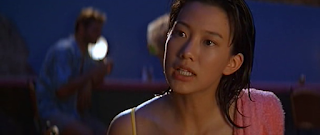Police Story 4: First Strike; or, The Manhattan Project
Killing me won't bring him back. Give me the bomb, and I'll
give you the money. I promise. And then you'll never see me again.
Police Story 4: First Strike punched its way to the big
screen on the 10th of February, 1996. It is the fourth entry in Jackie Chan’s
successful Police Story franchise and also the second movie, after Police Story 3: Super Cop (1992), directed by stuntman/filmmaker Stanley Tong.
Interestingly, many online sources often omit First Strike together with a
spin-off film, Project S (1993), from rundowns of the series. Even though First
Strike may be a forgotten Police Story sequel, it is still part of the
franchise and deserves to be discussed.
Release Info
Release Info
Directed by: Stanley Tong Starring: Jackie Chan, Jackson Lou, Wu Chen-chun, Yuriy Petrov
Language: English, Cantonese, Russian Original Title: 警察故事4之簡單任務 Runtime: 110 min (U.S. cut: 80 min)
Officer Ka-kui (Jackie Chan) is sent by uncle Wong (Bill
Tung) on a mission to follow a Ukrainian woman. It turns out that she serves as
the middle man in a transaction between an elusive spy Tsui (Jackson Lou) and
the Russian mobsters who want to buy nuclear warheads. Ka-kui interrupts the
transaction, but he gets badly injured in the process. He is rescued by the FSB
agency and the Russian authorities send him to Australia so that he can track
down Tsui. Ka-kui’s only lead is Tsui’s younger sister, Annie (Wu Chen-chun).
Never Say Never Again
Police Story 4: First Strike is yet another 90s
action-packed comedy filled with Jackie’s breathtaking stunts. The storyline must
have been inspired by Bond movies, particularly GoldenEye (1995), due to
espionage vibes and the nuclear weapons plot. However, as in many Jackie Chan’s
movies, the screenplay serves only as an excuse to present a sequence of
elaborate action set pieces.
In my opinion, First Strike lacks a bit in terms of action when
compared to the previous three films. Indeed, there are some great scenes (for
example, a ski chase, fight on parapets of a hotel, or a showdown at an
aquarium), but none of these surpass Jackie’s mall jump in the first movie or
train fight in Super Cop. Nevertheless, I appreciate beautiful locations shot
in the city of Brisbane, Australia.
That is not to say that First Strike is not enjoyable. On the
contrary, it is an entertaining action flick, but its main disadvantage is
caused by the fact that there are two versions of the film available out there:
The original uncut version (which runs at 110 minutes) and the American cut
(with 80 minutes of runtime). First Strike is one of the rare Jackie’s
productions that I prefer to watch in an altered form.
The uncut version has atrocious multi-national dialogue
(caused by amateur actors playing foreigners), bad pacing, and the music score
that is basically a looped tune. The American cut, on the other hand, has
extended opening credits, brand new English dubbing, and catchy music score
composed by J. Peter Robison. This cuts trims a bit the prologue sequence and
the aquarium fight. The only scene which, I believe, was fully deleted features Jackie
begging for money to make a phone call. In addition, the title was altered as
well. Instead of being called a Police Story, the film was released in the U.S. as Jackie
Chan’s First Strike.
Recommendations
Ironically, Police Story 4: First Strike serves as an
example presenting that a movie can be either broken or improved in the editing
room. Do I recommend it? Yes, but go for the American version. In consequence,
you will not be disappointed. Interestingly, First Strike remains (to date!)
Jackie Chan’s Hong Kong highest grossing picture. I wish that Jackie could keep
making Police Story sequels throughout the 90s. Eventually, he did make New
Police Story and Police Story 2013, but these were much more serious in tone.
Overall score: 6/10







No comments:
Post a Comment
Comment moderation is switched on due to recent spam postings.